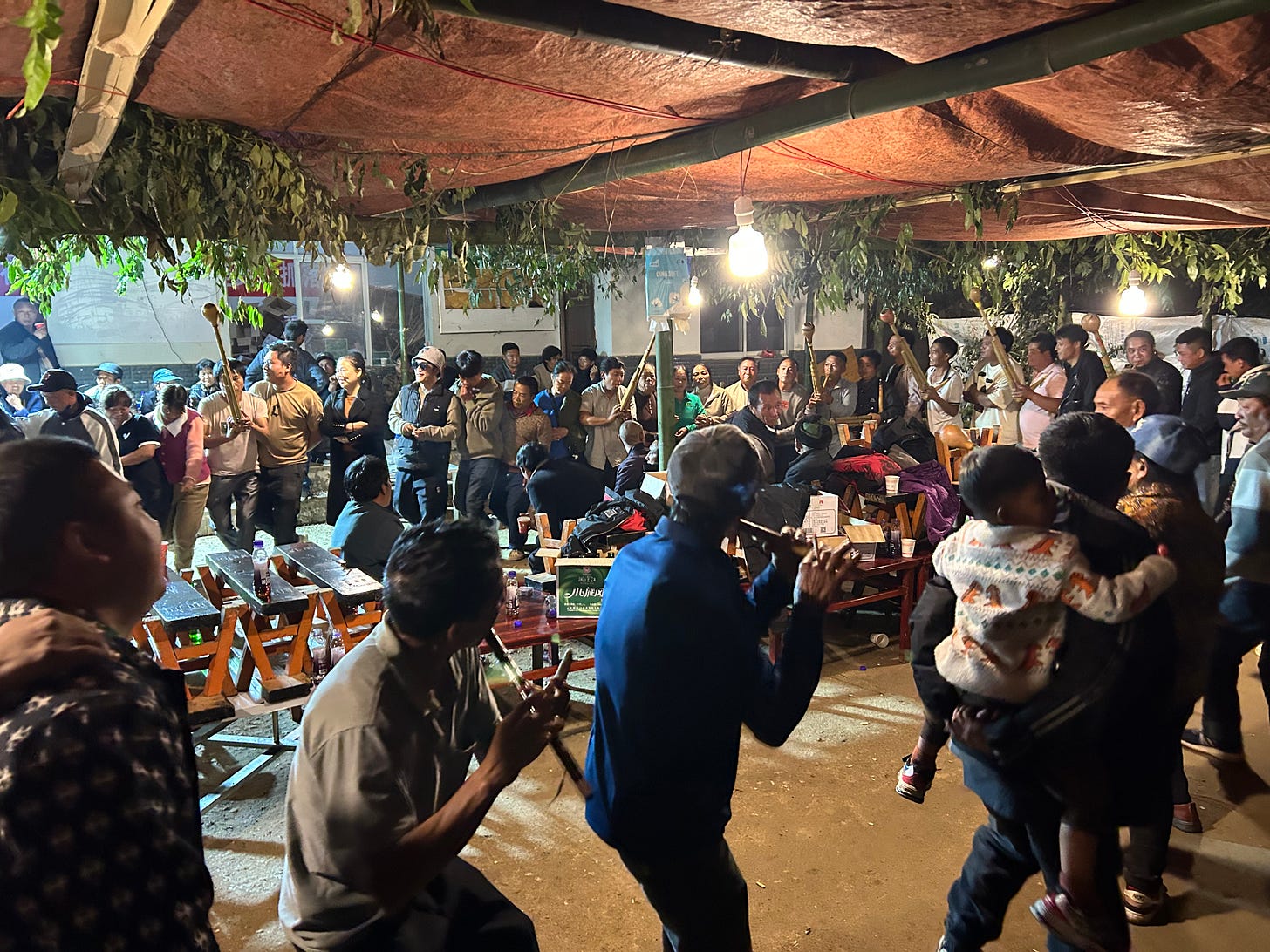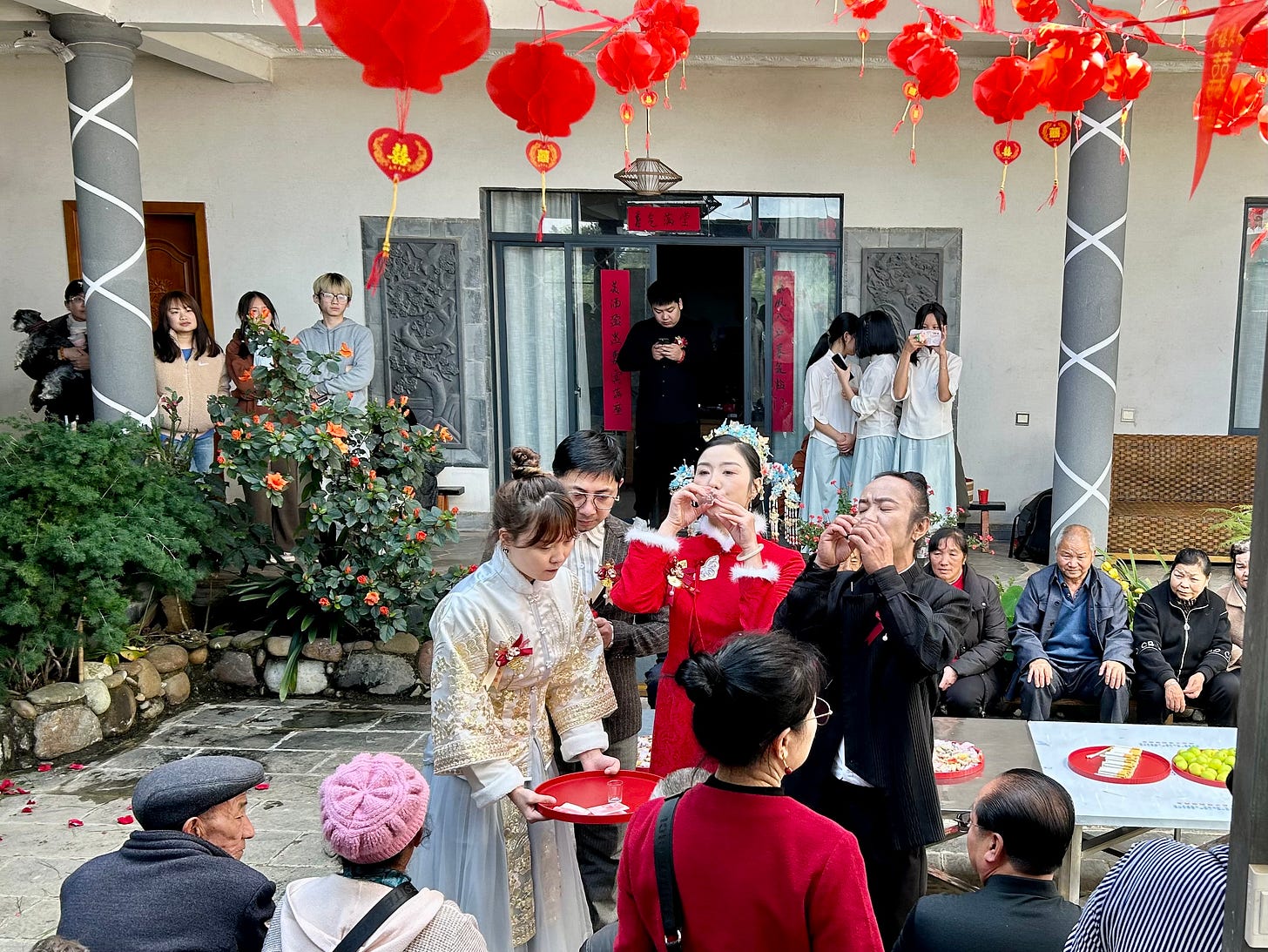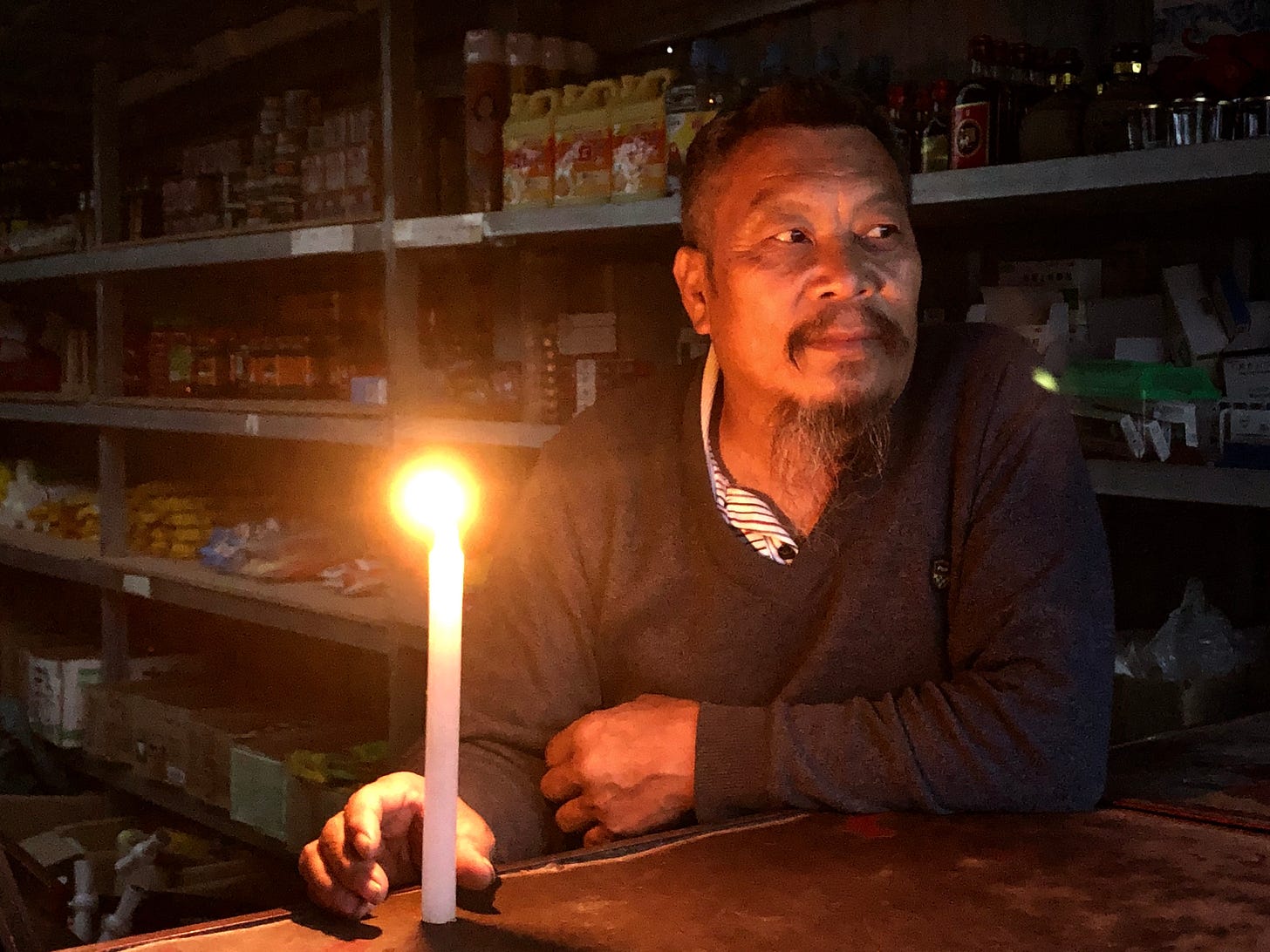Back to Bangdong village
A post-Covid visit to rural China reveals what it means to be a neighbor.
At precisely one o’clock in the afternoon, firecrackers echoed through the mountains around Bangdong village. The former mayor, Zhu Hong, stood in a dark suit and pale makeup alongside his red-adorned bride, Tang Qingmei, preparing to toast their parents with shots of corn baijiu. Zhu Hong’s wedding day had finally arrived.
“I don’t want to be a playboy anymore,” he’d told me, grimly, four years earlier, the night before I moved away from the village. “I want to become someone else.” We were both single and sat contemplating our futures, alone under a million stars—the kind of night sky I’d only seen there in remote southwest China, hours from the nearest city.
Women loved Zhu Hong. He was shorter than most of them, with the dark skin of a peasant and a wide, toothy grin—an unattractive catch by most Chinese standards. But he was charming and quick-witted with a penchant for fashion. By his own account, he had bedded hundreds of women before the age of 40, but now he’d met a girl, fallen in love, and was ready to settle down. Zhu Hong’s wedding, in part, brought me back to Bangdong. But I also returned to see how the village had changed and, perhaps more personally, if it still felt like home.
I left my base in Bangdong, a village of 350 people in the mountainous southwestern region of Yunnan in December 2019 at the conclusion of my two-year writing fellowship with the Institute of Current World Affairs. What was supposed to be only a few months away to see family turned into years when the Covid pandemic struck. China went into lockdown and the economy sputtered to a halt. In Bangdong, bamboo barricades were laid across roads to block the entry of outsiders and safety brigades sprayed down the village with disinfectant. Meanwhile, pu’er tea, the staple crop that grows from gnarled hundred-year-old trees sprawled across Bangdong’s terraced mountainsides, began to pile up in farmers’ homes as buyers in China’s cities tightened their purse strings due to economic uncertainty.
While the village endured many changes in my absence, some were for the better. President Xi Jinping had declared victory over poverty in rural China. New high-speed rail had been laid across Yunnan province, cutting through the mountains that had once left villages like Bangdong in isolation and poverty. And now the highway I’d watched being constructed over the course of my fellowship had opened, bypassing the narrow mountain roads I’d navigated on my motorcycle to get to the nearest city four hours away. What was once a winding 24-hour overnight bus from Kunming, the provincial capital, took me less than five hours to return for the wedding.
I wasn’t the only one returning to Bangdong. Zhu Hong’s wedding fell during Chinese New Year, so factory employees and construction workers had all returned to the village for New Year’s festivities as well as for the social event of the year. For three days, the entire village mobilized to skin, scale, peel, pluck, chop, slice and dice. Everyone did her or his part, although when I eagerly approached a table of 10 women carving up a pig, I was told men are “too stupid to handle cleavers,” and was relegated to the heavy lifting—tables and chairs, giant woks, cinder blocks for makeshift ovens, and 300 bottles of baijiu. In all, we prepared 500 fish, 80 chickens and seven pigs for over 2,000 guests from across China.
And while I worked elbow-to-elbow with my former neighbors, I learned of more changes in the village. Some had happy news. Another villager named Brother Liu, who’d helped me fix up an old mud-brick house to live in during my fellowship, had added a fourth floor to his home—perhaps signaling that his son’s relationship with a girl from a nearby village was going well. Li Rugui, whose journey from migrant laborer to tea mogul I wrote about in a monthly dispatch, had a daughter who was graduating high school—the first in her family—and was now of marrying age. And Xiaoping, one of the neighbor kids who used to stop by my old house to try peanut butter, Oreos or whatever comfort food “Uncle Foreigner” was into, was—despite the odds—still in school.
But many shared sad news—the kind of unexpected tragedies to which I’d grown accustomed while living in the village. Little Li, whom I’d visited on a construction site on my motorcycle journey around the province, had been in a dynamite accident while building a highway tunnel, and his face was scarred by shrapnel—he’d never see out of his right eye again. Yun Chuan, who once took me “electrofishing” with a car battery strapped to his back, had fallen two stories while working on his roof and was on forced bed rest for a year while the metal rod and screws in his spine healed. And the same Xiaoping had lost both his grandparents and was abandoned by his mother, so he now lived with his alcoholic, unemployed father and got enough to eat only because he was—despite the odds—still in school.
Some of the sad news moved me especially deeply. “Your old house is collapsed,” Neighbor Li told me while sticking his arm around my shoulder and a cigarette in my mouth, as if a small comfort.
When it collapsed, I had been shocked to see photos from Brother Liu over WeChat, the Chinese messaging app. But now visiting the Old House in person was not shocking but disorienting. I braced myself against its log frame, climbing inside over a pile of rammed earth, toppled mud bricks and planks from the second floor. Memories came flooding back—village kids riding in the wheelbarrow as we hauled bricks to build a bathroom; mornings at my writing desk overlooking the terraced mountainsides that swept down to the Mekong River; winter evenings with buddies by the fire roasting corn and toasting tea leaves in a clay pot.
Brother Liu and I had put a lot of work into the Old House to make it my home for two years—pouring concrete, wiring electricity (“Enough to see your house from space,” according to Liu), and even installing a Western toilet.
Now all that lay in rubble. Rainy season had come and, with no one living in the house to divert standing water, the earthen walls soaked it up and finally caved in. I grieved the loss. Without the Old House, my connection to Bangdong felt thin—vulnerable. My home was gone—had I become nothing more than a visitor?
But even more disorienting was my visit to the corner convenience shop where I used to sit for hours chatting with Master Kang. “He can’t talk politics with you anymore,” his wife told me, fighting back tears. My friend, in his 70s, had died just two days before I arrived. He woke up one morning with stomach pain and was gone by nightfall.
I sat in silence with Master Kang’s widow and son, whom I’d only ever known as Big Meat. We impulsively cracked sunflower seeds and spit the shells on the ground. “He left so suddenly,” Big Meat said finally, breaking the silence. “So suddenly.”
I sat with them, my arm around Big Meat’s broad shoulders and his thick hand on my thigh. We shared stories of Master Kang. We drank hot tea as sunflower hulls piled on the ground. I sent them photos I’d taken of their husband and father—ones they’d never seen. We shared more silence.
I opened up about the changes in my life as well. My dear friend Dave Hicks, who had spent a week with me in Bangdong and joined me on an overnight fishing trip on the Mekong, had since died from cancer—a loss I was still grieving. And I also shared happy news, for I had also met a girl, fallen in love, and married—and Liza and I were expecting our first child, a son, in just two months.
Sharing our grief and joy closed the distance of our years apart.
After the wedding feast, I danced with my neighbors until 3 a.m., arm-in-arm, round-and-round to the drone of gourd flutes. Then, the following morning, I left Bangdong as slowly as I’d come. Despite the new highways and high-speed rail, it still took a full two days to get back home. And while four days of travel for three days of wedding was well worth it, I was eager to get home to my wife.
“Come again soon,” Zhu Hong said.
“Next time, the three of you,” added his bride, Qingmei.
“Four is better!” Zhu Hong grinned.
As my car pulled away, I watched through the rear window as Zhu Hong removed his Panama hat and gave a sweeping bow, his man bun toppling over his head. He held that pose until the mountainside hid him from view.
I slumped into the seat, exhausted, replaying scenes from the weekend in my mind and recounting stories of celebration and sorrow from my neighbors. After four years away, I now felt more at home in Bangdong than when I had a house there. It occurred to me that I hadn’t created a home by renovating the Old House—my neighbors created a home for me by inviting me into their joy and grief.
Home is where your neighbors are.

One year later, on the day of their first wedding anniversary, I got a text from Zhu Hong:
“Your goddaughter was just born!”
He shared photos of his precious newborn, Zhujia Muxi, smothered in blankets and held by a proud dad in a Panama hat. “The godfather is like a second father,” he explained over voice message. “So when you give her a name from over there, she’ll take your last name, too.”
Sometimes neighbors become family. I named her Juniper Mercy Chitwood.
Matt Chitwood spent two years as an ICWA fellow (2017-2019) in rural Yunnan, China’s southwestern-most province. In his home village of Bangdong, population 350, he was surrounded by hillsides of tea, walnuts and coffee—the lifeblood of his neighbors. His research and writing focused on how infrastructure development in Yunnan was rapidly transforming its people, land, economy and governance during a major government campaign to end rural poverty.
Matt is currently director of Edelman Public & Government Affairs’ China portfolio and Global Voice initiative, where he advises on regulatory challenges and thought leadership across industries.






